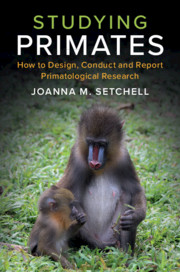Book contents
- Studying Primates
- Studying Primates
- Copyright page
- Dedication
- Contents
- Preface
- Acknowledgements
- 1 Asking Questions about Primates
- 2 Ethics in Primatology
- 3 Keeping Science Healthy: Research Integrity
- 4 Inclusive Science
- 5 Understanding Statistical Evidence
- 6 Communicating Ideas in Writing
- 7 Introduction to the Primates
- 8 Why Study Primates?
- 9 Identifying a Research Question
- 10 Finding Out What We Know
- 11 Reading Journal Articles
- 12 Formulating Hypotheses and Predictions and Designing a Study
- 13 Observing and Manipulating
- 14 Choosing Measures
- 15 Planning Data Analysis
- 16 Sampling and Statistical Power
- 17 Checking Feasibility and Finalising Your Plans
- 18 Writing a Research Proposal
- 19 Collecting Data
- 20 Conducting Fieldwork
- 21 Analysing and Interpreting Data
- 22 Writing a Scientific Report
- 23 Submitting to a Peer-Reviewed Journal
- 24 Presenting Your Work at a Conference
- 25 Conclusions
- Index
- References
6 - Communicating Ideas in Writing
Published online by Cambridge University Press: 19 September 2019
- Studying Primates
- Studying Primates
- Copyright page
- Dedication
- Contents
- Preface
- Acknowledgements
- 1 Asking Questions about Primates
- 2 Ethics in Primatology
- 3 Keeping Science Healthy: Research Integrity
- 4 Inclusive Science
- 5 Understanding Statistical Evidence
- 6 Communicating Ideas in Writing
- 7 Introduction to the Primates
- 8 Why Study Primates?
- 9 Identifying a Research Question
- 10 Finding Out What We Know
- 11 Reading Journal Articles
- 12 Formulating Hypotheses and Predictions and Designing a Study
- 13 Observing and Manipulating
- 14 Choosing Measures
- 15 Planning Data Analysis
- 16 Sampling and Statistical Power
- 17 Checking Feasibility and Finalising Your Plans
- 18 Writing a Research Proposal
- 19 Collecting Data
- 20 Conducting Fieldwork
- 21 Analysing and Interpreting Data
- 22 Writing a Scientific Report
- 23 Submitting to a Peer-Reviewed Journal
- 24 Presenting Your Work at a Conference
- 25 Conclusions
- Index
- References
Summary
The ability to write is an essential component of research. We write to communicate with readers. Our readers include funding bodies, thesis examiners, manuscript editors, reviewers, or readers of a journal. In each case, we write to convince a reader of our argument. In reports, we also write to allow a reader to check and interpret our findings for themselves. Good writing conveys information to readers as clearly and simply as possible. Poor writing obscures meaning, frustrates the audience and puts them off reading our work. Poorly crafted writing can make the reader suspect that our science may also be confused. To avoid this, write clearly, simply, precisely and concisely. Writing takes practice. In this chapter I cover general points, which apply to all scientific writing. I begin with advice on drafting, and the need to revise, obtain feedback and revise your draft again. This iterative process can come as a surprise to students accustomed to submitting work for a deadline, then forgetting about it. I then cover general style, followed by specific topics including structure and clarity.
- Type
- Chapter
- Information
- Studying PrimatesHow to Design, Conduct and Report Primatological Research, pp. 67 - 96Publisher: Cambridge University PressPrint publication year: 2019
References
Further Reading
There’s lots of advice on the Internet, including a de-jargoniser: http://scienceandpublic.com. The first paragraph of this box is 95% suitable for a general audience.
The Up-Goer five challenge uses Theo Sanderson’s text editor (http://splasho.com/upgoer5/) and is based on webcomic xkcd’s description of a space rocket using only the 1000 most used words in English (https://xkcd.com/1133/).
Further Reading
Further Reading
There’s plenty of similar advice on the Internet. Make your own list and share it with colleagues. Challenge yourself to write as concisely as possible.
Further Reading
You’ll find further lists of common errors in all books on writing. Also see any good dictionary, grammar blogs, and style guides.
Further Reading
6.18 Further Reading
Also see the many academic writing blogs online.

